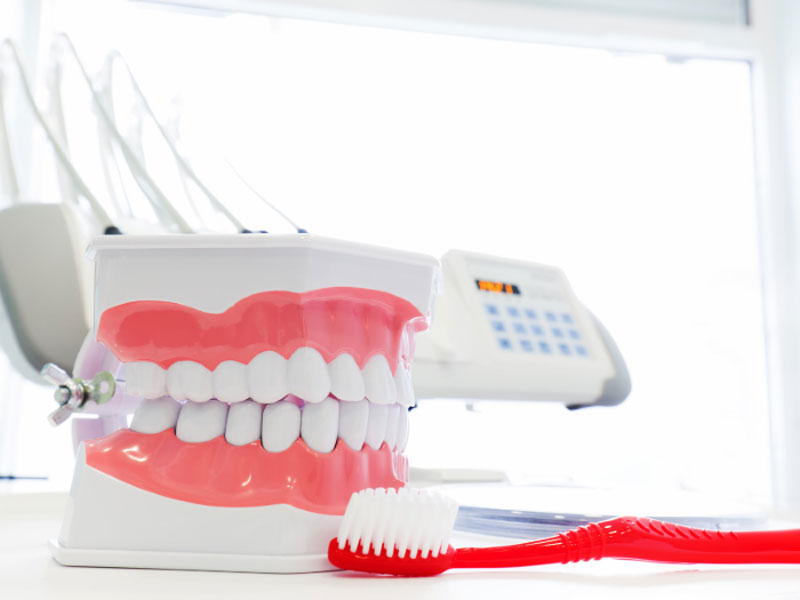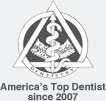The Complete Guide to Gum Disease

As a prosthodontics office, you won’t be surprised to learn that we take gum disease quite seriously. While it is relatively common for adults in the U.S. to have gum disease, that fact doesn’t make this problem any less important. On the low end of the spectrum, gum disease can lead to inflammation in the gums, which may be uncomfortable but not do much damage. As it worsens, however, gum disease can actually lead to the loss of teeth. Obviously, we want to take care of this problem before it gets anywhere near that point. In this article, we are going to cover the topic of gum disease from top to bottom.
It All Starts with Bacteria
At the heart of the gum, the disease issue is bacteria. At any given time, your mouth is full of bacteria, and that isn’t actually a bad thing. Bacteria perform plenty of beneficial functions for the human body, but they come along with some negative side effects. In your mouth, one of those negative side effects is plaque buildup on your teeth. As you know, brushing and flossing regularly can help eliminate the plaque from your teeth. Some are likely to remain, however, especially if you fail to visit your dentist or hygienist regularly for a cleaning.
Eventually, the plaque that has been allowed to remain in your mouth can turn into tartar, and that tartar is not going to be wiped away by a simple toothbrush. It will take a serious cleaning performed by a professional to eliminate the negative effects of tartar buildup. While this tartar has been collecting on your teeth, there is a good chance that you have developed gingivitis, which is the precursor to gum disease (actually, gingivitis itself is considered a minor form of gum disease).
Arriving at Periodontitis
When you have gum disease, you have a condition known as periodontitis. This can be seen when your gums begin to pull away from your teeth, and pockets are formed in those spaces. Unfortunately, those pockets will become infected, and a number of negative health outcomes can stem from that issue. As your body fights off the infection, it is also going to be fighting against your own teeth. Given enough time, the bone at the base of your teeth can be eaten away, and the teeth may become loose (or just fall out).
What is the Cause?
As mentioned above, you can trace the start of gum disease to the bacteria that live in your mouth. So, how do you steer clear of developing gum disease down the line? The best thing you can do is to take small steps in the right direction with regard to your oral health. For starters, you should avoid smoking. Steering clear of smoking cigarettes is a good decision for your health all around, and that is certainly true when it comes to your gums. Not only will you be more likely to develop gum disease if you are a smoker, but your smoking habit will also make it more difficult to treat the issue. Smokers often have bad teeth, and gum disease is a major part of the problem.
In addition to smoking, other risk factors include diabetes, certain prescription medications, other illnesses, and more. As you can see, some of these things – unlike smoking – are out of your control. So, if you know that you have a risk factor for gum disease, it is wise to keep an eye on the issue and seek help from your dentist at the first sign of trouble.
How Do You Spot Gum Disease?
As is usually the case, it will be beneficial to your treatment if you are able to catch this problem in the early stages. There are a number of signs you can watch for if you are concerned that you may have gum disease. One of the common signs of trouble is persistent bad breath, even when you haven’t eaten anything that would normally contribute to bad breath. Or you may notice that you have swollen gums, pain when chewing, or loose teeth. The best thing you can do is to pay close attention to the health of your mouth as a whole, and your gums specifically. If anything seems off, contact your dentist and set up and appointment right away.
Treatment Options
The treatment used to address your gum disease is going to depend on the severity of the problem. For starters, you may go through a deep cleaning to pull away as much plaque and tartar from the area as possible. Of course, once you have gone through a deep cleaning process, it will then be important for you to keep your mouth as clean as possible at home. Brushing and flossing consistently are going to give you the best chance to maintain a clean mouth after the dentist has done the work of removing buildup.
For some patients, a deep cleaning is not going to be enough to address the problem. When that is the case, it will be necessary to either use medications or surgery. There are a few medicinal options, so again it is going to depend on the specifics of your case with regard to which medicine is used. In cases that may call for surgery, you will want to speak honestly with your dentist about the pros and cons of surgery, and what you can expect. No surgery should be entered into lightly, but it may be the best option in advanced cases of gum disease.
If you are concerned that you may be developing gum disease, or you would simply like to have your mouth examined in order to put your mind at ease, please contact our office right away. We work hard to help our patients avoid the damaging effects of advanced gum disease, but we can’t do it without your help. Do your part by using good oral hygiene at home and come see your dentist regularly for checkups and cleanings.
At Pacific Northwest Prosthodontics, we take great care to make sure our patients are happy and healthy. We specialize in dental restorations that help your smile look as pleasing and natural as possible. Good gum hygiene contributes to this. Contact us today to see how the specialists can make all the difference in helping you achieve your oral health goals.

 (425) 549-4649
(425) 549-4649







